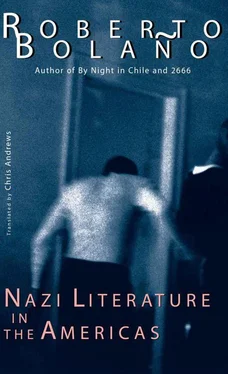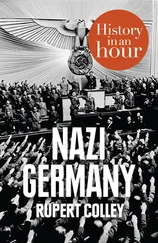In the following years he traveled around the world several times, directed two films and gathered around him in Caracas a group of young writers and critics, with whom he founded the magazine Second Round , a bimonthly devoted to the arts and certain sports (mountain climbing, boxing, rugby, football, horse racing, baseball, track and field, swimming, hunting, and game fishing) which were always examined from the writer’s or adventurer’s point of view, by the finest stylists Segundo José Heredia could muster.
In 1970 he published his fourth and final novel, which he considered his masterpiece: Saturnalia , the story of two young friends, who in the course of a week-long journey through France are confronted with the most horrendous acts they have ever witnessed, without being able to tell for sure whether or not they are dreaming. The novel includes scenes of rape, sexual and workplace sadism, incest, impaling, and human sacrifice in prisons crowded to the physical limit; there are convoluted murder plots in the tradition of Conan Doyle, colorful and realistic descriptions of every Paris neighborhood, and, incidentally, one of the most vivid and spine-chilling female characters in Venezuelan literature since 1950: Elisenda, the enemy of the two young men.
Saturnalia was banned for some time in Venezuela, and later reissued by two South American publishers, before lapsing into oblivion, with the author’s apparent consent.
In the sixties he founded the short-lived Aryan Naturist Commune (or “nudist colony,” as its detractors called it) near Calabozo, in the state of Guárico.
In his final years he attached little importance to his day-to-day life and none at all to his literary works.
Juiz de Fora, Brazil, 1948–Paris, 1989
Couto wrote a book of stories, which all the publishers rejected. The manuscript went astray. Then he began work with the death squads, kidnapping, participating in torture and witnessing the killing of certain prisoners, but he went on thinking about literature, and specifically what it was that Brazilian literature needed. It needed avant-garde, experimental writing, a real shake-up, but not like the Campos brothers, they were boring, a pair of insipid professors, and not like Osman Lins, who was downright unreadable. (Why did they publish Osman Lins and not Couto’s stories?) No, something modern but more up his alley, a kind of crime thriller (Brazilian, though, not North American), a new Rubem Fonseca, in a word. Now there was a good writer; he was rumored to be a son of a bitch, but Couto was keeping an open mind. One day, while he was waiting in a field with the car, he had an idea: why not kidnap Fonseca and give him a going-over. He told his superiors and they listened. But the idea never came to fruition. Couto’s dreams were clouded and illuminated by the possibility of making Fonseca the focus of a real-life novel. The superiors had superiors in turn and somewhere up the chain of command Fonseca’s name evaporated — disappeared — but in the chain of Couto’s thoughts, the name continued to grow and accrue prestige, opening itself to his thrust, as if the name Fonseca were a wound and the name Couto a knife. He read Fonseca, he read the wound until it began to suppurate; then he fell ill and his colleagues took him to hospital, where they say he became delirious: he saw the great Brazilian crime thriller in a hepatology unit; he saw it in detail, the plot complete with set-up and resolution, and he saw himself in the Egyptian desert approaching the unfinished pyramids like a wave (he was the wave). So he wrote the novel and had it published. Entitled Nothing to Say, it was a crime thriller. The hero was called Paulinho. Sometimes Paulinho worked for certain gentlemen as a chauffeur, sometimes he was a detective, and sometimes he was a skeleton smoking in a corridor, listening to distant cries, a skeleton who visited every dwelling (no, in fact only middle-class dwellings and those of the seriously poor) but never came too close to the inhabitants. The novel was published on the Black Pistol list, which was made up of North American, French and Brazilian thrillers, the proportion of local titles having risen as funds to buy foreign rights ran short. His colleagues read the novel and almost all of them found it incomprehensible. By then they were no longer cruising in the car or kidnapping and torturing, although they did still occasionally kill. I have to dissociate myself from these people and be a writer, Couto wrote. But he was conscientious. Once he tried to meet Fonseca. According to Couto, they looked at each other. And Couto thought: He’s so old; he’s not Mandrake any more, or anybody else. But he would gladly have changed places with Fonseca, if only for a week. He also thought that Fonseca’s gaze was harder than his own. I live among pirañas, he wrote, but Don Rubem Fonseca lives in a tank full of metaphysical sharks. He wrote a letter to his hero, but received no reply. So he wrote another novel, The Last Word , published by Black Pistol, in which the return of Paulinho is a pretext for Couto to bare his soul to Fonseca, shamelessly, as if saying, Here I am, alone with my pirañas, while my colleagues drive around the city center in the small hours of the morning, like the Tonton Macoute who come to take bad children away. . such are the mysteries of literature. And although he probably knew that Fonseca would never read his novels, he went on writing. In The Last Word more skeletons appear. Paulinho is a skeleton almost all day long. His clients are skeletons. The people he talks to, fucks and eats with (although he usually eats alone) are also skeletons. And in the third novel, The Mute Girl , the major cities of Brazil are like enormous skeletons, while the villages are like little children’s skeletons, and sometimes even the words are transformed into bones. After that Couto stopped writing. Someone told him that his colleagues from the patrol had begun to disappear, and fear took hold of him, or rather tightened its grip and entered his body. He tried to retrace his steps and find familiar faces, but everything had changed while he was writing. Certain strangers began to talk about his novels. One of them could have been Fonseca, but wasn’t. I had him in the palm of my hand, he noted in his diary before disappearing like a dream. He had gone to Paris, where he hanged himself in a room at the Hôtel La Grèce.
Montevideo, 1940–Montevideo, 2006
Author of a monumental and largely unreliable biography of San Martín, in which, among other inaccuracies, the general is said to have been Uruguayan, Hevia also wrote stories, collected in the volume Seas and Offices , and two novels: Jason’s Prize , a fable suggesting that life on Earth is the result of a disastrous intergalactic television game show; and Montevideo — Buenos Aires , a novel about friendship, full of exhaustive all-night conversations.
He worked in television journalism, discharging lowly tasks for the most part, with occasional stints as a producer.
For some years he lived in Paris, where he became acquainted with the theories espoused by The Review of Contemporary History , which were to make a deep and lasting impression on him. He was a friend of the French philosopher Étienne de Saint Étienne, whose work he translated.
Richmond, 1949—Richmond, 2014
Harry Sibelius was prompted to write one of the most complex and dense works of his day (and possibly also one of the most futile) by his reading of Norman Spinrad and Philip K. Dick, and perhaps also by reflecting on a story by Borges. The novel, since it is a novel and not a work of history, is simple in appearance. It is founded on the following supposition: Germany, in alliance with Italy, Spain and the Vichy government in France, defeats England in the autumn of 1941. In the summer of the following year, four million soldiers are mobilized in an attack on the Soviet Union, which capitulates in 1944, except for pockets of sporadic resistance in Siberia. In the spring of 1946, European troops attack the United States from the East, while Japan invades from the West. In the winter of the same year New York falls, then Boston, Washington, Richmond, San Francisco and Los Angeles. The infantry and German Panzers cross the Appalachians; the Canadians withdraw to the interior; the United States government shifts its seat to Kansas City; and defeat is imminent on every front. The capitulation takes place in 1948. Alaska, part of California and part of Mexico are handed over to Japan. The rest of North America is occupied by the Germans. Harry Sibelius perfunctorily explains all these developments in a ten-page introduction (which is in fact little more than a list of key dates to give the reader historical points of reference), entitled “A Bird’s Eye View.” Then the novel proper— The True Son of Job —begins: 1,333 pages darkly mirroring Arnold J. Toynbee’s Hitler’s Europe .
Читать дальше












